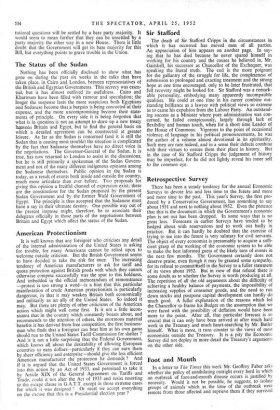Retrospective Survey
There has been a steady tendency for the annual Economic Surveys to devote less and less time to the future and more and more time to the past. This year's Survey, the first pro- duced by a Conservative Government, has something to say about 1951 and next to nothing about 1952. Even the pretence that this is the document in which the Government's economic plan is set out has been dropped. In some ways that is no great loss. Forecasts in earlier Surveys have tended to be hedged about with reservations and to work out badly in practice. But it can hardly be doubted that the exercise of trying to see into the future is very salutary for civil servants. The object of every economist is presumably to acquire a suffi- cient grasp of the working of the economic system to be able to make the best informed guess of the likely turn of events in the next few months. The Government certainly does not deserve praise, even though it may be granted some sympathy, for its refusal to commitsitself in the Survey to a fuller statement of its views about 1952. But in view of that refusal there is some doubt as to whether the Survey is worth producing at all. The repetition of all the old arguments about the difficulty of achieving a healthy balance of payments, the impossibility of increasing supplies of consumer goods, and the need to run down stocks and postpone capital development can hardly do much good. A fuller explanation of the reasons which led the Chancellor to frame his Budget on the assumption that we were faced with the possibility of deflation would have been more to the point. After all, that particular forecast is so crucial that it can only have been arrived at after much hard work in the Treasury and much heart-searching by Mr. Butler himself. What is more, it runs counter to the views of most economists outside the Treasury. It is a pity the Economic Survey did not deploy in more detail the Treasury's arguments on the other side.


































 Previous page
Previous page